Chaos and confusion: The frenzied final hours of the Afghan government
- Published
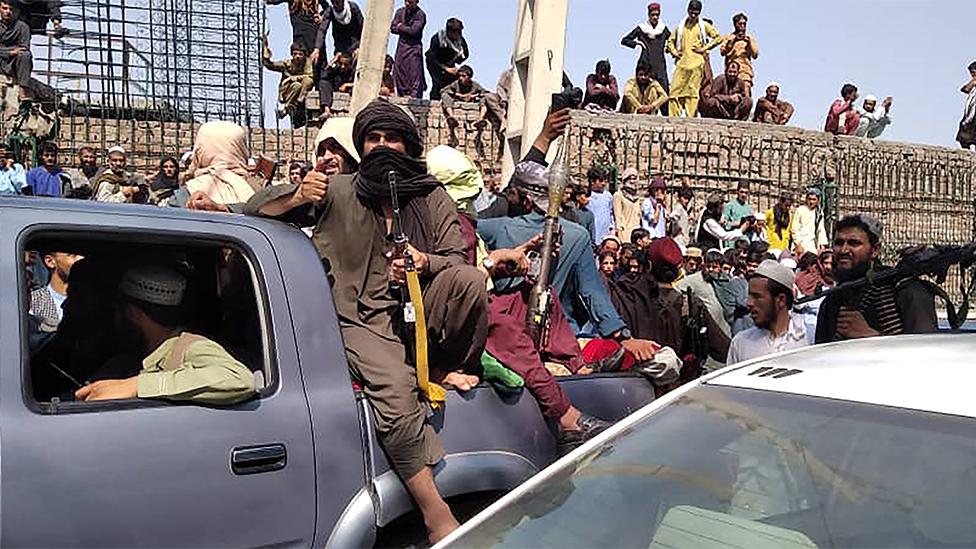
Taliban fighters sit on a vehicle in Jalalabad province, 15 August 2021
The Taliban have announced a new government from Kabul, 20 years after they were driven from power.
For a generation that grew up with education, international investment and hope in a democratic future, reading that line must feel scarcely believable.
So how did the previous administration fall so quickly? The Taliban went from taking control of their first major city to arriving at the gates of Kabul in just 10 days.
But the capital, it was assumed, would be different. Most observers believed that Kabul would hold until a negotiated agreement could take place. On Sunday 15 August, that all changed. Within hours, the president and his top officials had fled. What was left of the Afghan army and police forces changed out of their uniforms, and went into hiding.
The Western-backed Afghan government, backed by trillions of dollars in military support and training over two decades, had simply melted away.
Through interviews with insiders who were there, BBC News has pieced together an account of how Afghanistan's government unravelled during those chaotic and frantic last few hours.
Saturday, 14 August
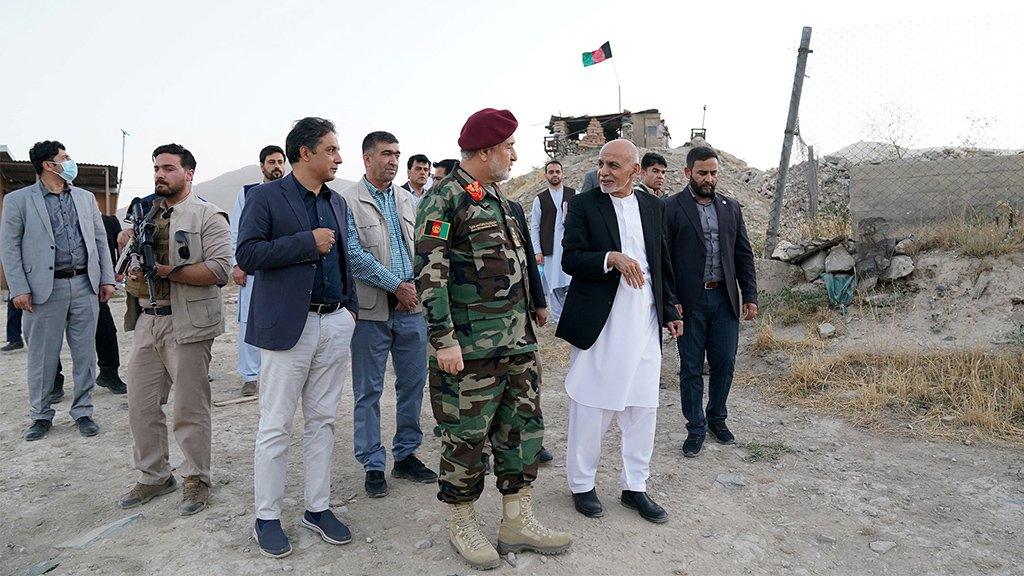
Ashraf Ghani and acting defence minister Bismillah Khan Mohammadi visit military corps in Kabul, 14 August 2021
The mood among the inner circle of Ashraf Ghani, the Afghan president, was concerned, but not panicked, high-level sources told the BBC. A plan to secure the capital had been drawn up, and was being discussed with General Haibatullah Alizai, the chief of the army staff, and Admiral Peter Vasely, the top US military officer in Afghanistan. Central to the plan were negotiations to halt the Taliban advance outside the city gates.
Sami Sadat, a former Afghan army commander in Helmand, the country's largest province, was drafted in to head a new Kabul security team. The plan was to fight if necessary, but ideally to try to secure a peaceful settlement with the Taliban. If that couldn't be achieved, then the Kabul administration wanted at the very least to buy time for evacuations.
But even as Lt Gen Sadat met his top team, Taliban were taking over the largest city in the north of the country, Mazar-e-Sharif, and were beginning to pour into the eastern city of Jalalabad. Both cities were falling with barely a fight.
Kabul was the last city standing.
Ashraf Ghani, a former academic and World Bank official, had been president of Afghanistan since September 2014. Critics within the Afghan government told us he had consistently failed to assess the Taliban threat accurately during the final weeks of their advance.
But no doubt at the forefront of his mind was the fate of former President Mohammed Najibullah. In fact Mr Ghani went on to reference this moment of history when he later explained his reasons for leaving, external.
Mr Najibullah was captured by the Taliban when the group took over Kabul in 1996. Taliban fighters dragged him out of the UN compound where he was sheltering and tortured him. After killing him they hung his body from a traffic light outside the presidential palace.
Sunday morning, 15 August
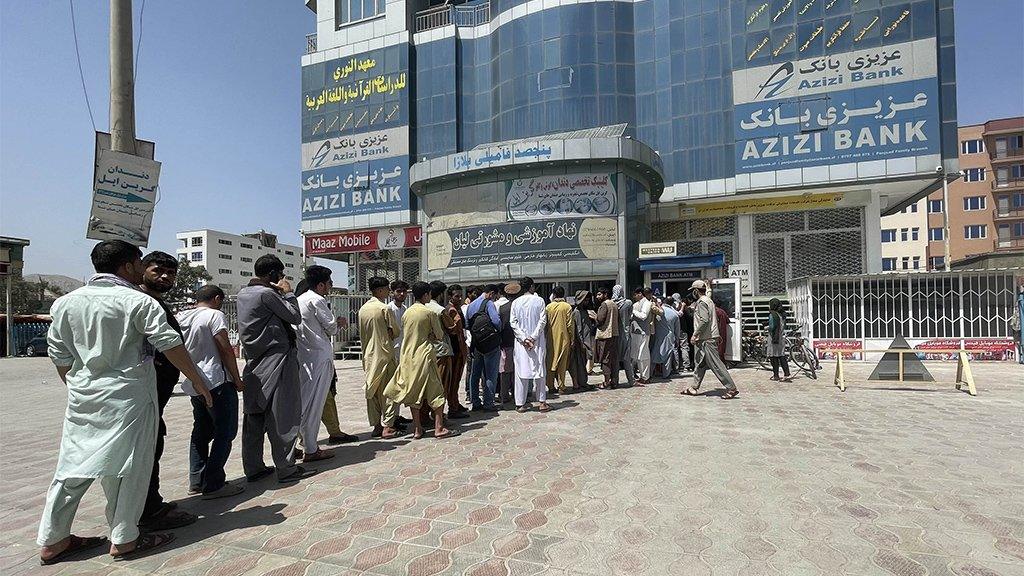
Afghan people queue up outside Azizi Bank in Kabul, 15 August 2021
As day broke there was growing unease among residents as reports emerged of Taliban fighters arriving at the city gates, and queues had begun to form at the banks and airport. But President Ghani's inner circle still believed that a fall to the Taliban was not imminent.
Staff at the Arg, Kabul's imposing 19th Century presidential palace, arrived for work as usual.
Confidence would have been bolstered by an agreement brokered the previous day by one of the president's top aides, Salam Rahimi. According to a source close to Mr Ghani, Mr Rahimi had been engaged in back-channel communications with the Taliban, and had managed to secure an agreement that the group would refrain from taking over the city by force, in exchange for an interim power-sharing deal. This would allow for the evacuation of foreign nationals, and those under threat, to continue at the airport. It would also buy time for negotiations already under way in Qatar to broker a unity government.

Ashraf Ghani appears in a Facebook video, 15 August 2021
In an effort to reassure Kabul's residents, Ghani's team posted a video on Sunday on the official presidential Facebook page, showing him discussing the city's protection with his interior minister and other security officials. It showed him sitting at an ornate wooden desk, talking to his minister on speaker phone. The clip seemed to suggest that an agreement with the Taliban was imminent, and that any fighting in Kabul would be avoided.
But it would seem that this was not enough to reassure all of his senior ministers. BBC sources say the president was having trouble getting through to other members of his top team. His vice-president, Amrullah Saleh, had already escaped to the Panjshir Valley, some 30 miles from Kabul, while the defence minister, Bismillah Khan, could not be reached. The plan had begun to unravel.

Meanwhile, a group of about a dozen high-level Afghan politicians were headed to the airport to catch a commercial flight to Islamabad. The group included the speaker of the House of the People, Mir Rahman Rahmani, and former Vice-President Karim Khalili.
One member of the delegation, Shakib Sharifi, an official with the Ministry of Agriculture, denied later media reports that their trip was an evacuation.
"Our aim was to convince the Pakistani government to mediate and avoid bloodshed in Afghanistan," he said.
But President Ghani did not want them to leave. "He feared that we would negotiate a deal with Pakistan's help that would cut him out of power. He was totally against us going," Mr Sharifi said.
Observers have suggested that the president may also have been anxious to avoid triggering further panic by allowing the parliamentary speaker to leave the country.
Mr Sharifi described witnessing a scene of widespread panic in the city as he and the others in the delegation made their way to the airport.
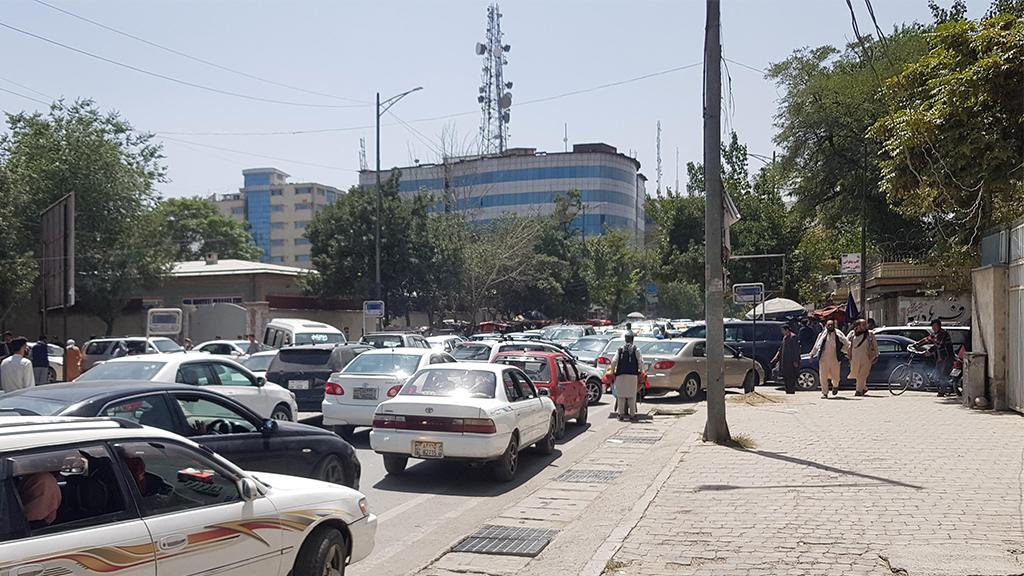
Gridlock as Taliban begins to enter outskirts of Kabul, 15 August 2021
"We had heard that the Taliban were at the gates, but didn't think they would be so quick to enter the city. The previous night we had been extremely nervous, and we slept with our weapons beside us.
"There were queues outside banks as people rushed to get dollars out; there were queues at the airport as people tried to get in; and huge amounts of traffic."
The traffic was so bad that former Vice-President Khalili who was travelling separately to the others, had to get out and walk the last 15 minutes to the airport to make it in time.
Once at the airport, the group was receiving regular updates reporting Taliban advances.
"Every minute we received reports that the Taliban had captured key places in the city. It was frightening."
Inside the airport, all semblance of order had collapsed.
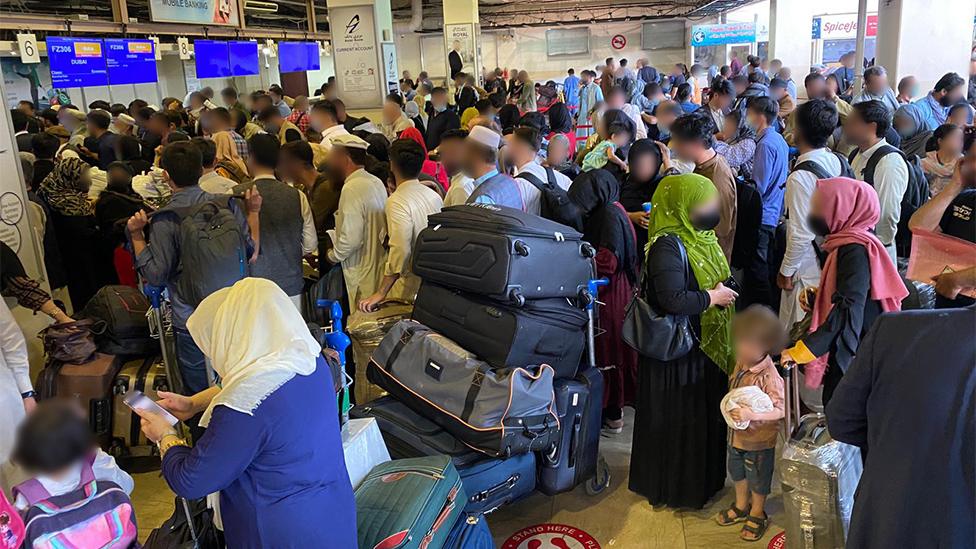
People crowd into Kabul airport, 15 August 2021
A BBC reporter saw people scrambling for tickets for the last remaining commercial flights. Some of those who already had secured them were bumped down the list, as MPs, singers and other VIPs arrived and took their place.
Soon, border officials and airport security personnel began disappearing, leaving their stations unmanned and passengers unscreened. People began to pour onto the tarmac.
Eventually, the delegation made it onto its Pakistan International Airlines flight. But the plane was ordered by air traffic control not to take off, and to await further instructions.
"We thought that at any minute Taliban militants could take the airport," said Mr Sharifi. "We thought of ways to defend ourselves should they get on to the plane, using what we had. The only thing I could use that was heavy enough was a laptop battery."
Sunday noon
Back at the presidential palace, the situation was also deteriorating. Mr Ghani was still frantically trying to reach his top officials in the defence and interior ministries, with little success.
A senior government official told the BBC: "It seemed like the whole government machinery had collapsed and people, including high ranking officials, had been split into groups. None of these groups knew anything about the others.
"We were expecting some sort of guidance from the palace. But nothing came."
The circle around Mr Ghani himself was growing increasingly small and isolated. The only other people making key decisions with Mr Ghani were his national security adviser, Hamdullah Mohib, and his chief of staff, Fazel Fazly, several sources told the BBC.
Mr Mohib, the 38-year-old Western-educated former Afghan ambassador to the US, was perhaps Mr Ghani's most trusted aide. Despite him having no military or security background, Mr Ghani made him his national security adviser in 2018, putting him in charge of crucial military decisions.
Sources inside the palace told us that around noon, Mr Mohib began to forcefully push for an evacuation. An hour previously, shots had been heard outside the palace. Mr Ghani himself was reluctant to leave, according to those there. Mr Mohib told the president that there was an imminent threat to his life.
"Mohib told Ghani that the Taliban were on their way and that they would capture him and kill him. He was extremely worried," said one palace insider.
Meanwhile, a sense of deep uncertainty was beginning to set in across Kabul.
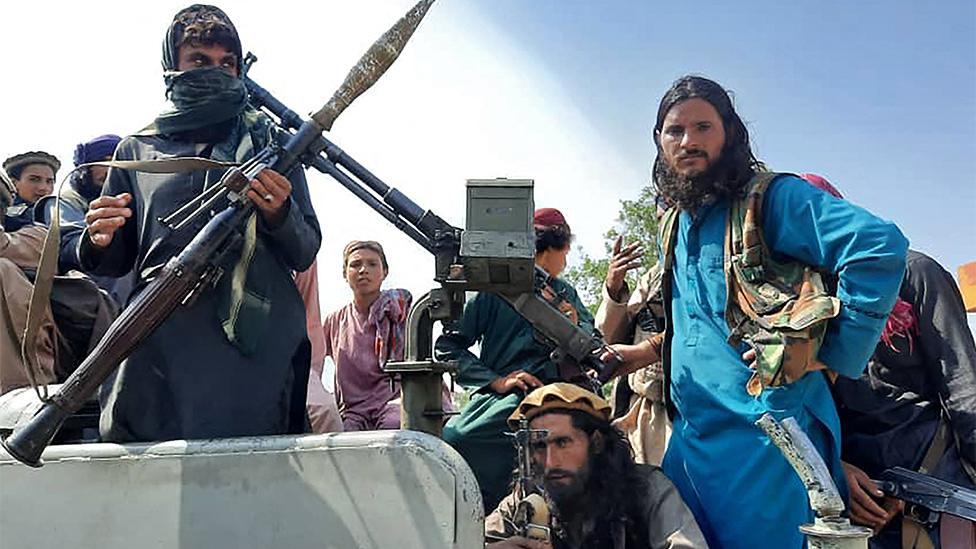
Taliban fighters in Laghman province, close to Kabul, 15 August 2021
One resident told the BBC: "I was at the office, [and] at around 14:00, social media was full of pictures of the Taliban fighters inside the city. Colleagues started gathering their things to leave. We didn't talk to each other. When I left the office, the streets were packed. Shops were closed. I heard gunfire. I doubted everybody."
Multiple sources suggest that the president's personal security guards were against the plan for him to leave. When three helicopters arrived at the palace to take President Ghani, his wife and his aides away, there was pushing and shouting between those getting on board and the guards who remained.
Witnesses report bags being thrown onto the ground as people were boarding the helicopter. Some reports suggested these contained cash used to pay off the guards, although it has been impossible to verify these accounts. Mr Ghani himself, in a subsequent message from the UAE, has denied allegations that he left the country with substantial amounts of money.
Around 15:30, President Ghani and his close aides, including Mr Mohib and Mr Fazly, left the palace on board the helicopters.
They flew to Termez, Uzbekistan, then onwards to the UAE. Hours later, in images beamed across the world, triumphant but clearly surprised Taliban fighters were pictured at the same desk in the presidential palace that President Ghani was sitting at just hours earlier.
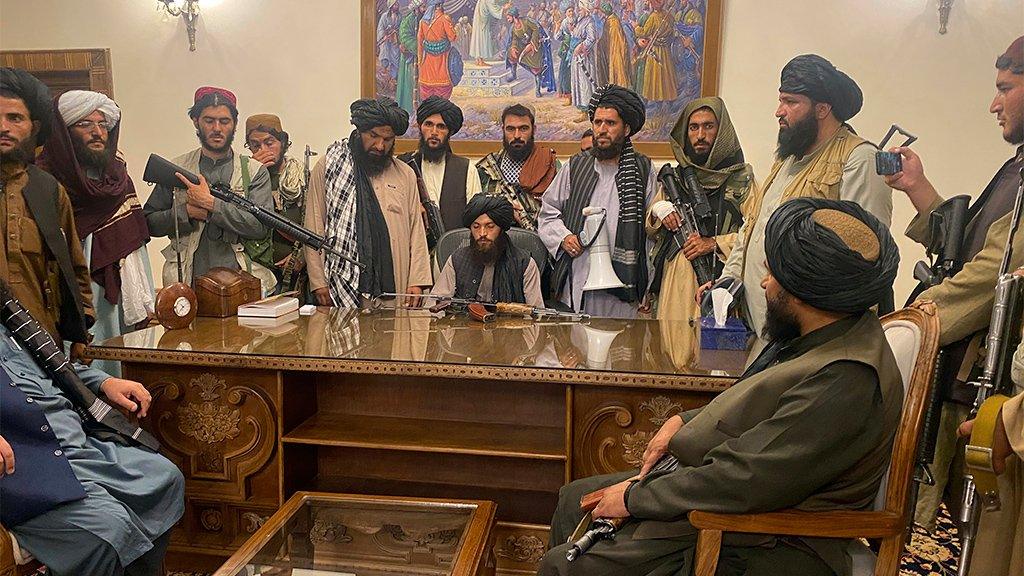
Taliban fighters take control of Afghan presidential palace, Kabul - Mr Ghani's book still in position
A book that was on the desk during Mr Ghani's morning conference call was still there, bookmarked to the same page - seemingly untouched. But now the Taliban were starting a new chapter.

Back at the airport, other high-ranking members of government waited. News of Mr Ghani's escape had not yet filtered through.
"I could literally count a couple of dozen very high-ranking officials, including ministers, sitting and waiting next to the tarmac," a senior government official said. "Everyone was asking each other about President Ghani's whereabouts. But it seemed like nobody knew where he was."
On the concourse, Pakistan Airlines flight PK6250 carrying Mr Sharifi and the rest of his delegation was still stranded, four and a half hours after its passengers first boarded. Civilian air traffic control had gone silent.
The pilot had to make a decision.
Across the airport, on the military side, Chinook helicopters and other US military planes were continually departing.
Pilot Maqsood Bajrani then made a spur of the moment call to take off without authorisation, an action that would later see him hailed as a hero in Pakistan. He told local media that he simply followed two military planes out onto the runway.
Mr Sharifi described the Afghan delegation's relief.
"We were so happy that we had finally taken off, but we at the same time, sad because we didn't know for sure when we could come back."
They did not know at the time that the president had already fled.

A few days later, President Ghani appeared live on Facebook from the UAE, where he had been allowed to stay for "humanitarian reasons".
Clearly hurt by criticism that he had fled his country in its hour of need, he sought to correct the record.
"It was not my decision to leave Kabul. It was the decision of my close security team. If I'd have stayed, there would have been bloodshed," he said.
"And what had happened 25 years ago in Afghanistan was going to happen again. I would have been hanged in front of the eyes of the people of Afghanistan and this would have been a dreadful disaster in our history."

While the speed at which the Taliban took Kabul on that Sunday afternoon was surprising to some, there had been clues elsewhere in the country.
BBC News has gained some insight into local negotiations that led to the surrender of one southern province to the Taliban.
A Taliban source in Zabul province, on the border with Pakistan, said the US withdrawal from the province in 2014 had left the Afghan army without material support.
"When American forces came to Zabul, they manned professional checkpoints and bases. But when they left, the Afghan army was unable to man and supply these. The Taliban cut off their supply lines and made it impossible for them to function," a member of a Taliban negotiating team in Shinkai district in Zabul told the BBC.
Taliban fighters, who already controlled much of the rural territory, gradually took over the checkpoints, forcing Afghan army forces back into their barracks. By mid June of 2021, the situation in Zabul had clearly tipped in the Taliban's favour.
"We decided to negotiate with a Jirga (tribal meeting), according to our local traditions," the source told the BBC.
The negotiations took place over two days, beginning on 15 June, and involved dozens of representatives from each side, led by a local Taliban commander called Mukhlis and Zabul's deputy governor Inayatullah Hotak. On the table were two main topics - how to guarantee the safety of Afghan army forces, and how to divide up the weapons between Taliban and locals.
An agreement was reached the following day, with elders agreeing to hand over Afghan army forces and weapons to the Taliban, who had guaranteed them safe passage to the provincial capital, Qalat. Soldiers also received 5000 Afghanis (about $55) each in payment, one light weapon each for personal protection, and enough vehicles to evacuate the city with. Together, hundreds of Afghan army personnel left Shinkai on 16 June to go to Qalat, under Taliban watch.
Our source says that one by one, several more local barracks in Zabul reached similar agreements guaranteeing safe passage.
Days later, Kabul too would fall.

For many in Afghanistan, Sunday 15 August marked the turning point from a life with promise to one without.
One resident told us that as night fell, there was a realisation that things had changed for ever.
"Now it is dark and quiet outside. It is the saddest night ever. Kabul holds its breath."
Additional reporting by the BBC's Afghan service